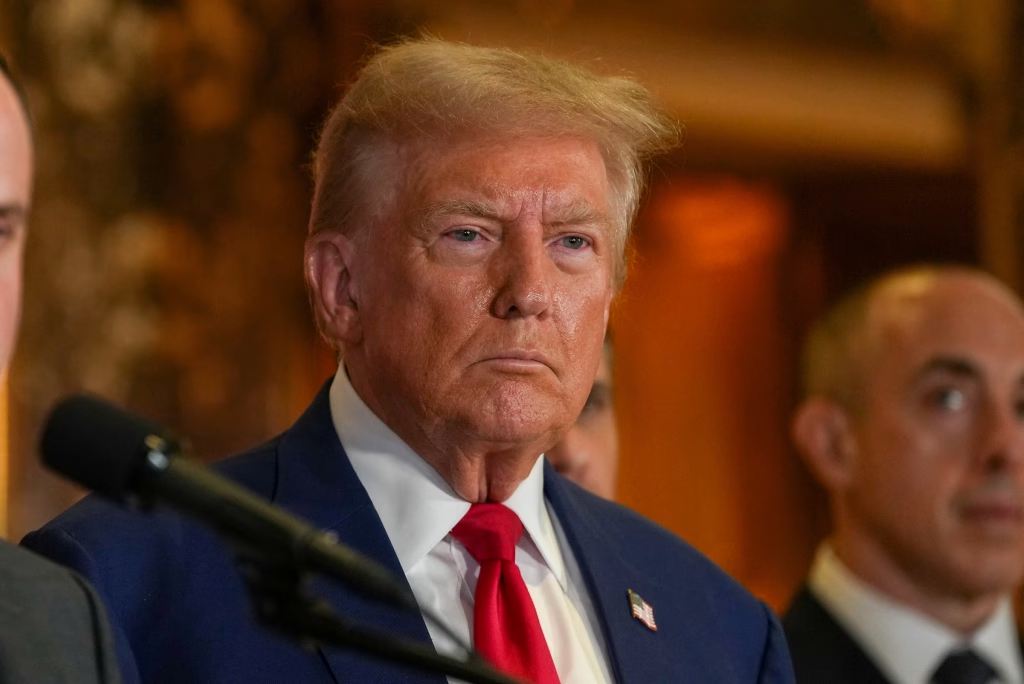
Trump continues to fight for a new “golden age” of the US even as his approval rating falls
The Trump administration has declared war on all fronts: sanctions for anti-Israel remarks, a ban on transgender people in the military, a purge of intelligence agencies and 100% duties on foreign films. These measures are designed to strengthen the president’s position ahead of the 2028 election.
From Hollywood to The Hague, the sanctions machine is up and running
Despite falling ratings due to “tariff wars,” Donald Trump continues reforms, including “culture wars” with liberals. Hollywood is already under informal government sanctions, and now British lawyers are under attack – among them Amal Clooney, George Clooney’s wife. Amal has ties to Ukraine: she worked with Yulia Tymoshenko and is now working with Andriy Yermak, Zelensky’s Head of the Office. However, sanctions could be imposed on her because of her role in the International Criminal Court (ICC). In 2023, she was on the board of experts that accused Israel of war crimes in Gaza. In February, Trump’s team had already imposed sanctions against ICC officials for Netanyahu’s arrest warrant.
The conflict with Clooney is also personal: Trump called George a “minor actor” for criticizing the pressure on the liberal media. In addition, the Democrats have not forgotten how Clooney contributed to Biden’s removal from the election in 2024, so support from their side should not be expected from him. The White House is already pressuring Hollywood, threatening investigations for its “racial-gender agenda” (Disney has already dropped transgender characters). Now sanctions against media figures are in Trump’s arsenal, especially amid his campaign against anti-Israel sentiment among the American left.
At the same time, the transgender lobby has been dealt another blow. The US Supreme Court upheld the Trump administration’s ban on transgender people serving in the military. Previously they were attracted by free sex reassignment surgeries, but now all 15,000 such servicemen will be dismissed. This is part of a plan to reduce the army by 90,000 people.

The court may soon also ban sex reassignment surgeries for children, a blow to lobbyists and pharmaceutical companies that make money from hormone therapy. Liberal states like California are pushing the transgender agenda in schools by hiding children’s sex change from parents. Since 2009, the number of transgender children has risen 1,000% among boys and 4,400% among girls. But most people in the US and Europe are tired of the gender agenda, which Trump is taking advantage of by increasing conservative policies. Ironically, the “culture of repeal” now threatens Biden’s own legacy. The family of Ashli Babbitt – an Air Force veteran shot and killed while storming the Capitol on Jan. 6 – has sought compensation from the Justice Department. At the same time, Republicans did not prosecute the cop shooter, unlike Derek Chauvin (the Floyd case), which shows the parties’ different approach to public servants. But much more importantly, Democrats in 2021 tried to paint Babbitt as a radical who deserved nothing but a bullet, but now the agenda has started to change.
In parallel, the Biden “autopen” case is gaining momentum. In the second half of his term, amid cognitive problems, many executive orders (including sanctions against Russia and China and pardons for the Biden family) were signed for him by aides. Republicans are pushing to overturn such decisions. Former Biden associates dodge questions about who really ran the country – perhaps his wife Jill or his inner circle. Against this backdrop, the possible return of Kamala Harris as a candidate in the next cycle is being discussed, what could repeat the chaos of the final period of Bidenism and strengthen Trump’s position.
Alcatraz for new “inmates”
The Trump administration has launched a major reform of security agencies in preparation for the upcoming election in 2028. The CIA and other intelligence agencies plan to lay off more than 1,000 employees and freeze the recruitment of new personnel. These measures are aimed not only at cutting costs, but also at getting rid of disloyal personnel. The priorities of the intelligence services are also changing: if under Biden the Middle East direction was curtailed (including the disbanding of the Iranian team), now 20% of the CIA budget is allocated exclusively for countering China.

Key personnel decisions also reflect the new course. For example, the appointment of Ralph Goff – a supporter of a strengthened Ukraine track – to the post of CIA director of covert operations was blocked. Instead, the administration is betting on the Indo-Pacific region. At the same time, a scandal erupted around the dismissal of National Security Advisor Mike Waltz, who was accused of ties to the Israeli lobby and unjustified escalation around Iran. Other agencies were also affected by the reforms. The State Department could lose half of its budget, leading to the closure of many consulates abroad. The Pentagon is also expected to make cuts – all part of austerity amid the budget crisis.
In parallel, the Trump administration is banking on powerful symbolic gestures. One of them is plans to restore the legendary Alcatraz prison, closed in 1963. It could be used to hold illegal migrants who were previously sent to Guantanamo Bay. However, the main blow is aimed at Hollywood. Trump has announced 100% duties on imports of foreign films, which will hit studios shooting in the UK and EU because of low costs. Already, filming activity in California is down 40% from 2022 and industry unemployment has reached 12%. Major studios have drastically cut production, with Warner Brothers down from 500 to 260 projects and Disney down from 280 to 170. Netflix has also slowed down. The crisis is exacerbated by the White House’s demands to abandon the “racial-gender agenda” and return filming to the US, despite high costs. As a result, Hollywood is trapped between economic sanctions and ideological pressure.
Trump’s Rank-and-File Zigzag
The Trump administration is taking decisive steps to address other key issues – the immigration crisis and foreign policy agenda. In the fight against illegal migration, a new approach has been proposed – a “self-deportation” program that provides $1,000 payments to voluntarily departing migrants. This method, which has already been tested in European countries, raises doubts about its effectiveness due to the modest size of the payments, which may not cover the cost of moving and may not stop repeated attempts to cross the border illegally.

Migrants linked to Mexican drug cartels are of particular concern to the authorities. Despite increased security along the southern border, there has been no real progress against the cartels due to resistance from Mexican authorities. President of Mexico Sheinbaum takes a tough stance, refusing to allow the US military to enter the country, which significantly limits Washington’s options. In parallel, the administration is considering alternatives, including deportation of migrants to third countries modeled on the UK’s agreement with Rwanda. Among the possible destinations are Kosovo, Moldova and even Ukraine, which may become an additional tool to support Kiev.
For the same reason, the White House has once again rushed to conclude international deals. In this context, the possibility of appointing Steve Witkoff as Trump’s new national security adviser has been discussed, although Stephen Miller, the migration and trade adviser, was also considered for the position, even though his key foreign policy priority is competition with China. Witkoff is busy negotiating with Russia and Iran, and earlier he announced the restoration of Israel’s Abraham Accords with Arab countries. The possible appointment of Witkoff means that in Trump’s second 100 days, the White House’s priority will be to seek to make deals on the Ukrainian and Middle Eastern tracks as soon as possible.
These measures are designed to strengthen Trump’s position amid a decline in his approval rating to 38-39% and demonstrate the fulfillment of campaign promises. However, the effectiveness of the proposed solutions remains questionable, especially in the face of resistance from Mexico and a complex international environment.
Trump’s ratings in foreign policy are not the highest now, and only about 40% of Americans like his negotiating position in the context of all conflicts. Therefore, it is necessary to raise the fallen ratings with promises to achieve rapid progress, and then we can get serious about resolving tariff wars, because there are so many trade deals to be made with other countries. But domestically, the 47th president of the United States feels more confident, and he continues to fight for a new “golden era” of the United States even in the face of falling ratings and international conflicts.

